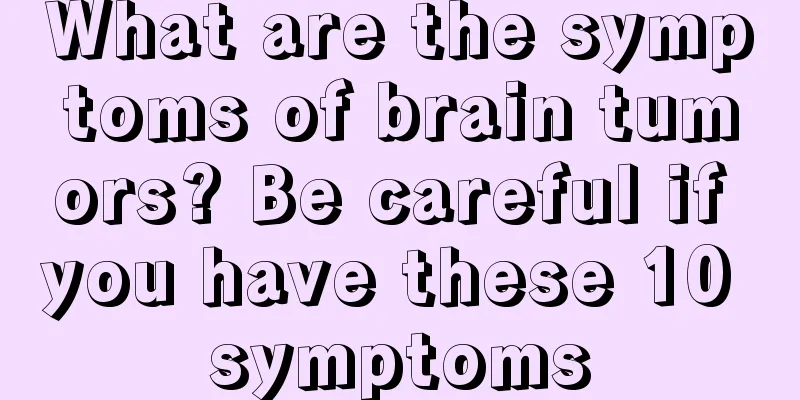What are the symptoms of brain tumors? Be careful if you have these 10 symptoms

|
Brain tumors can affect the functions of various systems of the human body, causing headaches, nausea, vomiting, and affecting the patient's endocrine system. They can also cause movement disorders, sensory disorders, and language, intelligence, hearing, vision and other disorders, which are extremely harmful to the human body. The brain is a very important organ in the human body. If a tumor occurs in the brain, it will have a great impact on the patient's health and daily life. Brain tumors can cause a series of symptoms in patients. Knowing these symptoms in time can help to detect and treat the tumor in time. So, what are the symptoms of brain tumors? 1. Headache Headaches in patients with brain tumors usually occur at night and in the early morning, especially when getting up. In addition, headaches can worsen when defecating, sneezing, and coughing. Patients may also experience projectile vomiting, after which the headache symptoms can be slightly relieved. 2. Hemiplegia Due to the compression of the tumor, the patient may experience weakness or paralysis on one side of the limbs or body. 3. Hemisensory disturbance The patient may experience numbness on one side of the body, decreased sensation of moisture and pain, etc., and may also have disorders of two-point discrimination, position sense, texture sense, graphic sense and solid sense. 4. Language Function Decline The patient's language function is impaired and he may lose the ability to express himself normally or be unable to understand other people's language. 5. Changes in Intellectual and Mental Health The patient becomes very slow and lazy, suffers memory loss or even memory loss, and in severe cases may also lose judgment or orientation, and experience mental changes such as indifference, irritability, and bad temper. 6. Epileptic seizures Localized or generalized seizures may occur. 7. Vision Changes The patient's vision may be affected, with unexplained vision loss and visual field changes. 8. Endocrine disorders Female brain tumor patients may experience symptoms of endocrine disorders, such as menstrual disorders and infertility. Male patients may experience sexual dysfunction, loss of libido, impotence, etc. Some patients may experience facial changes, obesity, gigantism, and acromegaly. 9. Hearing loss Patients often experience tinnitus, hearing loss, or even hearing loss. 10. Cerebellar and brainstem symptoms Patients may experience ataxia, have problems with daily walking, and walk unsteadily with a staggering gait. They may also experience difficulty swallowing, coughing when drinking water, and hoarseness. |
<<: How to treat cerebral hemisphere tumors? What are the treatments for cerebral hemisphere tumors?
>>: What is head and neck tumor? How to treat head and neck tumor?
Recommend
Can honey remove moles?
Many people have moles of varying sizes on their ...
Endometrial cancer-related genetic testing
The emergence of cancer is still a mystery that h...
Which type of people are more susceptible to liver cancer? To prevent liver cancer, you should eat more of these foods
Liver cancer has a very high incidence in my coun...
Which type of esophageal cancer is most effective for chemotherapy
Studies have found that different pathological ty...
Waist and abdomen core strength training method
Recently, many people's fitness is not very g...
Can a bad stomach cause chest tightness? What are the symptoms?
There are many reasons for chest tightness. It ma...
How to prepare for having a baby girl?
Nowadays, many families are starting to have a se...
What are the common side effects of weight loss pills?
Nowadays, more and more people are paying attenti...
Recurrent cough due to endometrial cancer
Endometrial cancer is a common gynecological mali...
Which gallbladder cancer surgery affects fertility
With the continuous improvement of my country'...
How to effectively prevent lung cancer? Develop these good habits to prevent lung cancer
Lung cancer is a disease with a very high inciden...
How to reduce fat behind the neck?
A thick neck is a problem for many men and women....
Calcium oxalate stone treatment
When it comes to calcium oxalate stones, you may ...
How long is the best time to soak your feet in vinegar
It is usually sufficient to soak your feet in vin...
How to treat intestinal cancer caused by enteritis
Colorectal cancer is a common malignant tumor in ...









